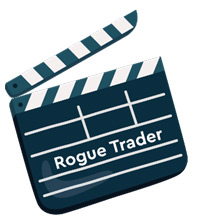Celebrating the Oscars: And the award for best business picture goes to...

Award-winning films often captivate audiences with their gripping storylines and memorable performances. But what about films that delve into the world of money, finance and business? To celebrate the Oscars, we explore these themes in film and what business lessons can be learnt. So, grab your popcorn and get ready to learn from the silver screen.
'But of all the drugs under God's blue heaven, here is one that is my absolute favourite.' A sentence narrated by Leonardo De Caprio as he holds up a dollar bill to camera. Di Caprio was playing the real-life infamous stock trader Jordan Belfort in Martin Scorsese's adaptation of Belfort's life, The Wolf of Wall Street. The film depicts the excesses pursued by Belfort and his associates before Belfort's luck runs out and he is incarcerated for illegal trading practices. The film was nominated for five academy awards, but unfortunately for Di Caprio and co there was no payout and they left with nothing.
But how popular are films about money? To mark the occasion of the Oscars, we have picked out three lesser-known older films concerning money and assessed their Oscar success. We'll also explore business lessons we can learn from the films.

Rogue Trader (1999)
Isn't it awful when you lose £5 on your trading app, or when your 50p each way bet on the Grand National doesn't show a return? Are you tempted to 'double down' to try and recoup the losses? Times that £5 by 280 million or that 50p by 2.8 billion and you will have replicated what rogue trader Nick Leeson did in the early nineties. He made speculative trades working for Baring's Bank, hiding the losses in an 'error' account. His actions resulted in losses of 1.4 billion dollars and the bankruptcy of the one of England's oldest banks.
Ewan McGregor stars as Leeson in the 1999 film 'Rogue Trader'. The film bombed at the box office, only returning £969,565 of its £12,800,000 budget. It received at best tepid reviews by critics and was further away from an Oscar nomination as Leeson was to getting another job trading for a bank. The audience reviews were warmer - the film currently has an IMDB rating of 6.4/10. We think the film is an entertaining and interesting watch, especially for those interested in the Leeson story, but a wasted opportunity to make a much better film from such an incredible story.
Lessons learnt:
- If you make a mistake, own up and move on. Don't do anything to exponentially increase the effects of the mistake.
- Avoid chasing bad investments and manage risks effectively.
- Maintain oversight over financial activities within your business.
How can it help business owners?
Risk Management: Leeson's downfall highlights the importance of effective risk management in financial transactions. As business owners, you may want to implement robust risk management strategies to identify, assess and mitigate potential risks in your operations.
Compliance and Regulation: The failure of Barings Bank due to Leeson's unauthorised trading activities highlights the critical importance of compliance with regulations and internal controls. You can ensure compliance with industry regulations and establish strict internal controls to prevent similar situations.
Ethical Conduct: Leeson's story serves as a cautionary tale about the consequences of unethical conduct in business. As business leaders and with help from management, you can emphasise ethical behaviour and integrity within their organisations, fostering a culture of honesty and accountability among employees.
Transparency and Accountability: Leeson's attempt to cover up his losses highlights the importance of transparency and accountability in financial reporting. You may want to prioritise transparency in your financial operations and promote accountability among employees at all levels.
Leadership and Oversight: The failure of Barings Bank raises questions about leadership and oversight within the organisation. Business owners can learn the importance of strong leadership and effective oversight in guiding the company's financial decisions and ensuring adherence to established policies and procedures.

Glengarry Glen Ross (1993)
If you want bang for your buck in the actor department then 1993's Glengarry Glen Ross might be the film for you. Al Pacino; Jack Lemon; Alec Baldwin; Ed Harris; Kevin Spacey; Alan Arkin; and Jonathon Pryce all-star in this adaptation of David Mamet's 1984 Pulitzer Prize winning play. If you have worked in sales and don't want to be reminded of the time you thought you might never make a sale again then it might not be the film for you. The film zones in on the pressurised sales side of business whilst also taking aim at what we might now refer to as toxic masculinity. Four real estate salesmen are delivered an ultimatum by one of the firm's top salesmen Blake (played by a slick-haired Baldwin). The two men who finish the week with the least sales will be sacked. Desperate measures ensue as the pressure mounts on the four men.
Being an adaptation from a play, the film is wordy and set mostly within the confines of a drab office. The action arrives from the confrontations between the great actors. This might not be to everyone's taste, but we think the set-up works fantastically well. It is like they gathered up seven world-class actors, threw them in a room together and shouted one instruction at them – 'Act!'
Like Rogue Trader, this film also didn't manage to show a return at the box office. It didn't bomb as much though, making $10.7 million back from its $12.5 million budget. The critics praised the film, and it has gone on to become a cult classic. It has a 95% rating on Rotten Tomatoes and 7.7/10 on IMDB. Its only Oscar nomination was a Best Supporting Actor nomination for Al Pacino, which he lost out on to Gene Hackman for Unforgiven. Don't feel too bad for Al though, he won the Best Actor award for Scent of a Woman in the same year.
Lesson learnt:
- You might look upon this film about how to or how not to motivate your staff.
How can it help business owners?
Motivation Strategies: The film highlights various approaches to motivating sales teams, including both positive incentives and fear-based tactics. You may want to assess different motivation strategies, how to or how not to motivate your staff and tailor them to your team's goals.
Sales Performance Evaluation: The ultimatum delivered to the salesmen in the film points out the importance of evaluating sales performance and setting clear expectations for all staff. Therefore, you may want to implement performance evaluation systems that provide feedback and support team members in sales and also the wider team, so employees know what is expected of them and help them in achieving their goals.
Communication Skills: The confrontational nature of the film's dialogue highlights the importance of effective communication skills in the workplace. You may want to invest in training programmes that enhance communication skills and equip team members with the tools to engage effectively with customers and clients.

Margin Call (2011)
Margin Call, like Rogue Trader, places us back in the world of financial investment. This film takes place just before the financial crisis of 2008 and tells the story of a large Wall Street investment bank trying to offload problematic assets in order to avoid bankruptcy.
Like Glengarry Glenross, the film's locations are limited, but the ensemble of actors thrive. Kevin Spacey, Paul Bettany, Demi Moore, and Stanley Tucci are all excellent as the employees dealing with the moral questions surrounding their decision to sell worthless stock, whilst trying to secure their own futures in the investment business. Jeremy Irons however steals the film. He plays alpha CEO John Tuld, who arrives after the bank's predicament is discovered. Tuld philosophises his way through the financial problems encountered in the investment business, arriving at aphorisms such as: 'There are three ways to make a living in this business: be first, be smarter, or cheat.'
Both critics and audiences reacted well to this film. It has an 87% Rotten Tomatoes rating and 7.1/10 on IMDB. Unlike the other two films discussed, this one turned a healthy profit. From a $3.5 million budget, the film raked in $19.5 million at the box office. The film was nominated for one Oscar, in the Best Original Screenplay category but failed to take the prize home on the night, losing out to Woody Allen for his terrific Midnight in Paris.
Lesson learnt:
- Unfortunately, market crashes are an inevitable occurrence.
How can it help business owners?
Risk Assessment: The film stresses the importance of thorough risk assessment in financial decision-making. You can learn or get professional advice to analyse potential risks associated with investments and make informed decisions to mitigate those risks effectively.
Ethical Decision-Making: "Margin Call" highlights the ethical complexities surrounding financial transactions and the implications of unethical behaviour. You can prioritise ethical conduct within your organisations, ensuring that financial decisions are made with integrity and consideration for all stakeholders.
Crisis Management: The film depicts a high-stakes crisis situation within the investment bank and the strategies employed to address it. As business owners, you may want to learn from the characters' responses to crisis situations and develop effective crisis management plans to navigate challenges in your own businesses.
Transparency and Communication: Effective communication and transparency are key themes in "Margin Call," as characters grapple with the ethical implications of their actions. Business owners can prioritise open communication channels within their organisations and foster a culture of transparency to promote trust and accountability among employees.
Conclusion
From this very short list, we can quite unscientifically conclude that the Academy doesn't favour films concerning money or finance. This year's Best Picture nominations don't feature a film with clear connections to the theme, and there is also a clear absence of any such film from the list of past winners. The closest match might be Parasite, the 2019 winner which wouldn't match the quota per se but explores themes of greed and class discrimination which, in turn, leads us onto another conclusion. All the films mentioned seem to take aim at money and finance, using them to satirise the worlds they replicate. Of course, power should be held to account, and in the case of the financial crises of 2008 that Margin Call is based on, the ethical ramifications of boom-and-bust market economies is a worthy topic for discussion and dissection. But conversely, an argument can be made about the same financial systems having had positive impacts on society. Maybe Hollywood deems that story too boring to be told. Probably correctly, they don't see the conflict needed in a piece of drama about someone making sound investments and steady gains. However, in the last few years, a new trend has emerged in Hollywood. 'Business origin' stories such as 'The Founder' about the rise of McDonalds, and 'Joy', which tells the story of Joy Mangano, the woman who invented and marketed the Miracle Mop. These films tend to find some inspiration in entrepreneurial endeavours rather than satirise negative aspects of the business world.
Keep an eye out for more business insights. Join our newsletter so you never miss an article:
Register to our newsletter
PS: If you are reading this blog, you may be interested to know that the Chancellor announced a new tax credit for independent UK films with a budget of less than £15 million in the recent Spring Budget. Click here to view our Spring Budget report and see how it may affect you and your business.
